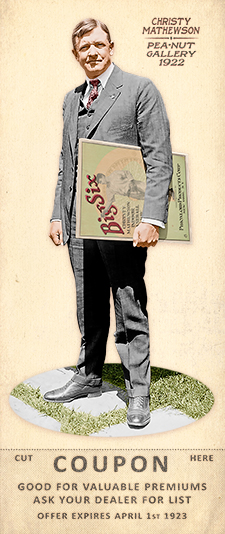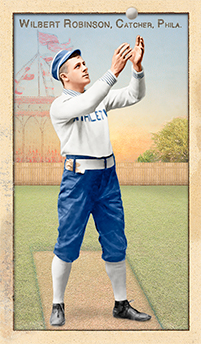- Series: 1919 Black Sox Scandal
- Hall: National Baseball Hall of Fame
Christopher Mathewson (1880-1925) was the consummate right hander of the early 20th Century. His “fadeaway” pitch baffled NL hitters from 1900-16. Mathewson won 22+ 12 straight years, 30+ 4x, and holds the modern NL record with his 37 wins in 1908. He hurled 3 shut-outs in 6 days to gain his sole world championship in 1905.
- One of the “first five” into Cooperstown
- Accomplished all this while honoring his Christian faith by not pitching on Sundays
- This Pilgrims card duplicates and preserves the uncorrected spelling error on Mathewson's original T201 Mecca card
- Elected to Hall of Fame: 1936
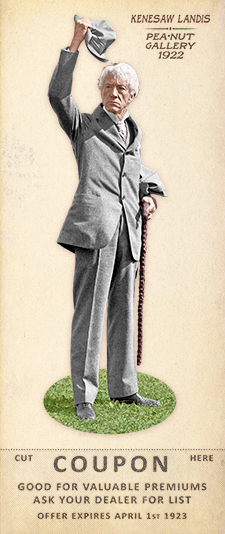
- Series: 1919 Black Sox Scandal
- Hall: National Baseball Hall of Fame
Kenesaw Mountain Landis (1866-1944) grew up in an era when a man could become a lawyer before going to law school; go to school later, turn down an ambassadorship, and be appointed to the Federal bench by Teddy Roosevelt all before the age of 40. He would soon vindicate TR’s eye for legal talent by hitting Standard Oil with a huge judgment in the “trust-busting” era. The young jurist thus displayed a boldness to tackle the biggest of business interests in a day when big business was a colossus bestriding America. Small wonder then, that in 1920, when major league owners recognized that their sport had a problem, they looked to Judge Landis to solve it for them.
Landis, named for the Civil War battle where his Ohio father was wounded, would live up to his name as a man who would make a massive impact on America’s Pastime and, since baseball “was America” as so many pundits often said, upon the nation itself. It wasn’t just Landis’ early political and legal accomplishments that foreshadowed his later role as baseball’s first commissioner. As District Judge in Chicago, KML cut a striking figure: “The Judge was always headline news. He was a great showman, theatrical in appearance, with his sharp jaw and shock of white hair, and people always crowded into his courtroom, knowing there would be something going on. There were few dull moments,” per friend and journalist A.L. Sloan.
Landis, a lifelong fan, and ardent White Sox supporter, heard a case brought in the Federal League uprising in which many baseball insiders feared he would rule against the reserve clause. He held hearings in January 1915, but never issued a ruling. KML outlasted the parties who eventually settled the case with reserve clause intact. Nevertheless, Landis was destined for far greater involvement with the game. Gambling and bribery of players had been an open secret for many years and reached a crisis in 1920 in the aftermath of the Runyanesque comedy of errors known as the Black Sox Scandal.
Baseball was ruled then by the “National Commission,” a triumvirate of both league presidents and Reds owner Garry Herrmann. Herrmann stepped aside, leaving a deadlock, and into that void stepped Kenesaw Mountain Landis. “We want a chairman who will rule with an iron hand…” said NL president John Heydler. (Translation: Please save us from ourselves.) The owners went hat in hand to KML’s courtroom and waited for him to finish his docket. They pitched and he caught, accepting the job of first Baseball Commissioner.
- Landis was an immediate hit with the public when he stepped into a seven-year term while continuing his day job
- “If I catch any crook in baseball, the rest of his life is going to be a pretty hot one” was KML’s vow and he made good, ousting the eight accused White Sox for life despite their acquittal in court. He forced owners to divorce themselves from horse racing and cracked down on all instances of gambling that he encountered, true to his word
- Elected to Hall of Fame: 1944
- Series: Beginnings: 1880's
- City: Philadelphia
- Team: Athletics (AA)
- League: American Association
- Hall: National Baseball Hall of Fame
Uncle Robbie (1863-1934). A durable catcher for 17 seasons with 3 teams, Robinson is credited as the 1st to play directly behind the plate at all times. Uncle Robbie once caught 5 games in two days. He also had 7 hits & 11 RBI in a single game. After his playing days were over, Robinson went on to manage for 18 seasons.
- Won 3 NL pennants as player
- Won 2 NL pennants as manager
- Won 5 NL pennants as pitching coach
- Elected to Hall of Fame: 1945
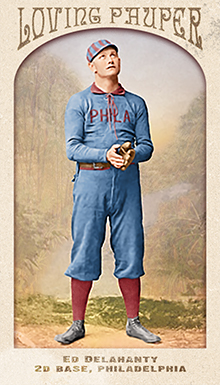
- Series: 1880s: Loving Paupers
- City: Philadelphia
- Team: Quakers
- League: National League
- Hall: National Baseball Hall of Fame
Edward James Delahanty (1867-1903) died in the icy waters of the Niagara River while still in his baseball prime. He was hitting .333 for the Senators that July of 1903, well below his days with the Phillies, but still a force to be reckoned with after a 16-year career in left field. Through the 1890s no hitter dominated as did Big Ed. With Sam Thompson and Billy Hamilton he formed an outfield-for-the-ages, each hitting .400+ in 1894. He struggled during his early years until, driven to excel, Ed transformed himself at the plate. Personal achievement had not brought a pennant, however, and Delahanty experienced the frustrations of the reserve system in his pursuit of the pay he felt was his due. As with so many players of that day, Ed turned to the bottle and was given to outbursts such as the one that got him ejected from the train the night he died. His tragic end came amid one of the great careers in baseball history.
- Only player to win batting titles in both AL & NL
- First to hit .400 three times
- Fifth all-time in career batting average (.346)
- 2nd player to hit 4 HRs in a game
- Elected to Hall of Fame: 1945
Auction History
Cartophilia
Old Judge Pose: 123-3
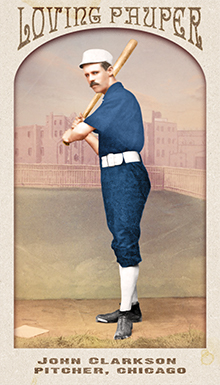
- Series: 1880s: Loving Paupers
- City: Chicago
- Team: White Stockings
- League: National League
- Hall: National Baseball Hall of Fame
John Gibson Clarkson (1861-1909) won 328 games, won the triple crown in 1889 and twice pitched more than 600 innings in a season. In 1885, John appeared in 70 games, threw 68 complete games, 623 innings, won 53, had an ERA of 1.85, a no-hitter, and won the pennant. Apparently having to hurl the sphere a mere fifty feet was a tonic to the arm. But unlike so many pitchers of his era, Clarkson didn’t flame out from such prodigious labor on the mound. From 1885-92 he AVERAGED 36 wins per season and would win 30+ an extraordinary six times. This great career began with the Worcester Ruby Legs in 1882, flowered with Cap Anson’s Sox in ‘84 and fully bloomed in Boston when John followed his ace catcher King Kelly to the Beaneaters in ‘88. League politics that culminated in the Players’ League revolt took a toll on Clarkson’s reputation and sundered his friendship with Kelly as the hurler remained loyal to the Nationals.
- Cleveland acquired John in 1892 allowing him to team with Cy Young. Chief Zimmer, who caught Young for a decade, proclaimed Clarkson the best he ever saw
- Elected to Hall of Fame: 1963
Auction History
Cartophilia
Old Judge Pose: 78-7
